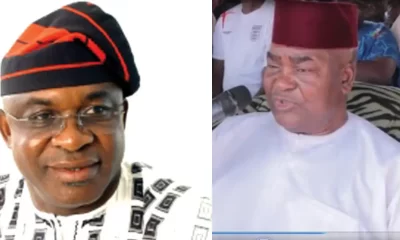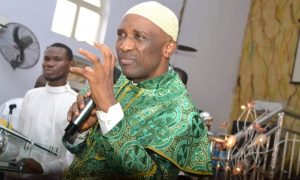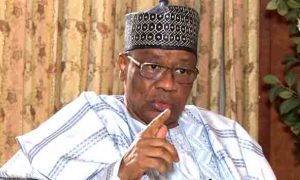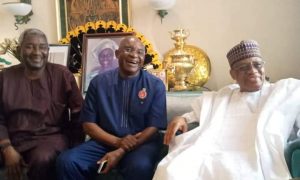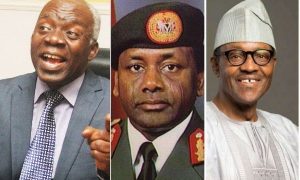Nigeria News
IBB reveals how he escaped Gideon Orkar’s coup attack in 1990

Former Military President, General Ibrahim Badamasi Babangida (IBB), has opened up about the failed coup attempt led by Major Gideon Orkar on April 22, 1990, describing it as a shocking and unexpected event.
In his autobiography, Journey in Service, IBB detailed how the attack unfolded at Dodan Barracks, revealing that it was his wife who first noticed unusual troop movements before gunfire erupted.
He recounted how his security team swiftly moved him and his family to safety while loyal forces, led by General Sani Abacha, crushed the rebellion.
Babangida also reflected on the betrayal by some of the coup plotters, whom he had personally supported in the past.
In his book, IBB recounts how the failed coup attempt by Gideon Orkar on April 22, 1990, took him by surprise.
He wrote: “BY APRIL 22, 1990, yet another military coup took place in the history of our administration.
“I must confess that what became known as the Orkar coup hit me as a rude surprise. As was my usual daily routine, I saw off the last set of visitors to my Dodan Barracks residence after 1 a.m.
Ahead of retiring to bed, I flipped through the various channels on the television to catch up on late news. I retired to bed without finding anything to arrest and keep my interest. The family was innocently asleep. My wife, who had gone to use the bathroom, rushed back to me to report that she had noticed some unusual movements on the premises outside.
“The troop movements and formations she had noticed were unusual in the security protocol of the residential part of Dodan Barracks. I stood up to have a look.
I noticed, as she had done, that troops that may not be part of the guard details of the residence were taking up strategic positions. I alerted my guards, who had already seen what was going on. Very shortly afterwards, small arms firing commenced. It targeted the residence and office quarters as window panes began to shatter.
This was followed by heavy artillery bombardment of the residential quarters.
“From that point, my ADC, Lt-Col. U. K. Bello, took charge. He had not been taken by surprise. Soon afterwards, the coup plotters were all over the place. They tried to invade the residence but were delayed and repelled by the guard’s formation of soldiers and state security officers.
I had some of the best. My guards did what they were trained to do best: to protect me and the family as their primary subjects.
“They recognised that my safety and those of my immediate family were of topmost priority. Even against my stubborn insistence that I was not leaving my residence for any reason, the boys succeeded in extracting me and the family in separate units to safe houses far from our residence, which had now been reduced to virtual rubble.
“Lt-Col. U. K. Bello and the boys moved to engage the disloyal soldiers. In the process of moving to deploy the military tank located near the residence, U. K. Bello discovered that the rebel soldiers had earlier sabotaged the vehicle and it could not be used to return the fire of the coup plotters.
“Loyal troops nonetheless engaged the coup makers, while military communication and signals rallied loyal forces. The critical command was put on alert. General Sani Abacha took control of the loyal forces as necessary and constantly communicated progress in the operation to foil the coup to me in my safe location. We had foiled the coup and were in the process of neutralising the disloyal troops and their allies.
“While the treasonable broadcast of the coup plotters was running on FRCN, the military operation to counter the coup and neutralise the plot was in full force. By late morning on 22 April, the coup had been successfully foiled. The treasonous broadcast on the radio was replaced by sustained martial music. The disloyal troops were on the run in different locations, first around Lagos and later in other adjoining locations, mostly in and around Lagos.
“Different military formations around the country pledged their continuing loyalty and allegiance to the Federal military government under my leadership. Arrests were being made as instant investigations were taking place, and the rebels were being rounded up and arrested.
“By the late afternoon, we addressed the nation, reassuring all of the president’s safety and the liquidation of the coup attempt.
I was saddened by the revelation of some of the coup’s ringleaders. I had known many of them personally and helped them in their careers and personal affairs. Orkar had frequently visited from his base at Shaki in Oyo State. I had on occasion instructed General Mamman Kontagora, then Minister of Works, to help him fix a precarious bridge near his base and repair the road leading there.
Colonel Nyiam was a regular communicator with Dodan Barracks, and he used to write in with his suggestions on national issues, which were duly appreciated.
“As the investigation proceeded, I could not help but reflect on the content of the coup plotters’ broadcasts: the laughable idea of sacking five states of the federation, the attempt to meddle in the Sokoto Sultanate, and the ridiculous accusations against the AFRC and myself. Happily, the informed populace condemned these laughable and adolescent accusations and proposals.
“The trials and investigations were concluded, and the culprits were punished for their high treason and crimes against the Federal Republic of Nigeria.
One aftermath of the Orkar coup attempt was reinforcing Nigerians’ confidence in the federation’s sovereignty and integrity.
“Even if the coup attempt was not as sloppy as it was, the public received very negatively the broadcast of certain states being expelled from the federation. Even worse was the adolescent pronouncements of the coup planners, which sought to devalue our national leadership, reduce our politics to petty name-calling, and deliberately reduce and devalue our strength in diversity as a nation.”




